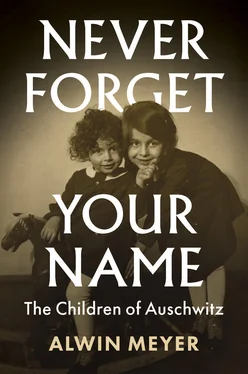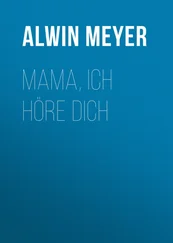‘The German soldier was very nice. He stayed in Saloniki for about a month. Then he was suddenly posted to Crete.’ Some time later, the German police stormed the house and took their parents and the grandfather who had fled from Karlsbad. ‘They were locked up by the Gestapo.’ Around three weeks later, they were fortunately transferred to another prison that was not supervised by the Gestapo.
Erika and Heinz had to remain alone in their house. ‘The other grandparents had already died.’ A former family housekeeper, relatives and friends helped them to manage. They had also done everything possible from the outset to obtain the release of Salvator and Hella Kounio and Ernst Löwy and consulted lawyers. It took several days to achieve. They were overjoyed to be able to embrace their mother, father and grandfather again. It turned out that they had been arrested because a thank-you letter from Helmut Held opened by the German censors had contained the comment: ‘Great preparations are being made here in Crete for the war in Africa.’
‘The young man had basically blabbed secret war information. That’s why the Gestapo interrogated our parents and grandfather.’ Later, the Kounio family learned that Helmut Held had criticized Hitler while drunk. ‘The young man was arrested and sentenced to death.’
‘As a result of all these events, we had now completely lost our childhood innocence.’
Herbert Adler One day, probably in February 1941, in Frankfurt am Main:
Two plain-clothed police officers came into my class and spoke with my teacher. Then they stood outside the door. Mr Erb said: ‘Herbert, come here.’ I went to him. ‘Yes, sir, what’s the matter?’ All kinds of thoughts occurred to me. ‘Have you done something wrong?’ I was a typical Frankfurt lad and had got up to mischief before. But I couldn’t think of anything. The teacher said to me: ‘Herbert, listen, there are two criminal police officers who want you to go with them. Apparently you’ve done something. Go with them. You’ll be back tomorrow.’ He probably knew better but wanted to reassure me because he didn’t know how to help me.
The boy took his satchel and left the classroom. Outside, Herbert saw that his brother Heinz was also there. They were brought home by two Gestapo men in a police car. The whole family was already there. ‘They had fetched my father from work.’
Herbert, his parents and his six brothers and sisters were taken to the camp for ‘gypsies’ in Dieselstrasse. They were only allowed to take the most necessary belongings. Everything else, they were told, would be brought to them the next day in their new home. This was an empty promise. Their furniture, the entire contents of their apartment, were seized, including a harp and some valuable violins. His father was also a very good musician who liked to play music in his spare time. They didn’t ever get anything back.
In the Dieselstrasse camp the Adler family lived in a small old wooden construction wagon. ‘There was no water, light or toilets.’ The furniture consisted of an old table and two chairs. At the back were two jacked-up planks for sleeping – for nine people. And for this makeshift accommodation the camp inmates even had to pay rent to the city of Frankfurt.
In May 1941, there were 160 Roma and Sinti in the Dieselstrasse camp. It was fenced in by chicken wire and two rows of barbed wire and was controlled and guarded by the police. There were roll calls every day. The inmates had to stand to attention and give the Nazi salute. Camp commandant Johannes Himmelheber used a whip to maintain discipline in the camp. At every opportunity, the police threatened to have the inmates transferred to a concentration camp and caused increasing anxiety and fear in this way. And Sinti and Roma were indeed deported to concentration camps on the basis of reports by Himmelheber.
After the war, Himmelheber continued to serve in the police. He was able to enjoy his retirement in 1952 until his death in 1971.
Herbert Adler: ‘After our arrival in early 1941, we children were not allowed to leave the camp. My father and other adults were initially allowed to go to work outside.’ When they first moved into the camp, he was still convinced that his father would fix it and that they would soon be able to leave again. Every day this hope dwindled, ‘until I realized what they really had in store for us’.
After an armaments company purchased the site and claimed it to enlarge its operations, the camp was closed in autumn 1942. 20The remaining Roma and Sinti, including the Adler family, were moved to the new camp in Kruppstrasse. ‘The conditions there were just as bad. And in the Kruppstrasse camp, we children were forced to work, mainly loading trucks with cobblestones.’ Also his little brother Rolf. He had just turned 9 years old.
‘One day, when we had loaded the truck and were driving to unload it, he fell out. We shouted out loud. But the driver didn’t react. My little brother was somehow dragged along. He died as a result. That was my first encounter with death.’
1 1 Lipscher, Die Juden, pp. 90−3.
2 2 For the developments in Topol’čany and Slovakia, see also Büchler, Topoltschany, pp. 93–173.
3 3 Ibid., pp. 159, 161−6.
4 4 Albert S. Kotowski, ‘“Ukrainisches Piemont?” – Die Karpatenukraine am Vorabend des Zweiten Weltkrieges’, in Jahrbücher für Geschichte Osteuropas, 49 (2001), p. 94; Gerlach and Aly, Das letzte Kapitel, pp. 482–3.
5 5 Gerlach and Aly, Das letzte Kapitel, p. 74.
6 6 Ibid., pp. 74−5.
7 7 Czech, Auschwitz Chronicle, p. 148.
8 8 Lipscher, Die Juden, p. 119.
9 9 Schmidt-Hartmann, ‘Tschechoslowakei’, p. 373.
10 10 Lipscher, Die Juden, p. 119.
11 11 Gerlach and Aly, Das letzte Kapitel, pp. 482–3; Gutman, Holocaust, vol. IV, pp. 1365–6.
12 12 Gutman, Holocaust, vol. II, pp. 610–12; vol. IV, p. 1325; Fleischer, ‘Griechenland’, pp. 245–6.
13 13 Gutman, Holocaust, vol. II, pp. 612–16.
14 14 Nar, ‘Die Juden von Thessaloniki’, pp. 83–4.
15 15 Benbassa and Rodrigue, Die Geschichte der sephardischen Juden, p. 235; Gutman, Holocaust, vol. IV, p. 1325.
16 16 Fleischer, ‘Griechenland’, pp. 250–1; Bossong, Die Sepharden, p. 110.
17 17 Stella Salem, ‘The Old Jewish Cemetery of Thessaloniki’, in Cultural Forum, pp. 58–9. Other publications also described the situation: see, for example, Benbassa and Rodrigue, Die Geschichte der sephardischen Juden, p. 236: ‘[War administration councillor Max Merten] demanded a ransom from the Jews of Saloniki of 3,500 million drachmae, subsequently reduced to 2,500 million. The Jewish community also agreed to hand over the centuries-old Jewish cemetery to the municipal authorities, which they had wished to take possession of in all the years between the wars. The cemetery was rapidly demolished.’ Gutman, Holocaust, vol. IV, p. 1326: ‘[The Jewish community] ransomed its young men… Part of the money was raised in Salonika and Athens; the rest came from the transfer of the five-hundred-year-old graveyard to the municipality, which systematically destroyed it.’ Bossong, Die Sepharden, p. 110: ‘In December 1942 the Nazi thugs razed the Jewish cemetery in the heart of the city … to the ground.’ Fleischer, ‘Griechenland’, pp. 250–1: ‘[Several weeks of] negotiations between the military authorities … and the Jewish community [ended] with an agreement …, by which the last of their hard-pressed brothers were bought free. After drawn-out negotiations … the ransom in billions … was agreed … In addition, the historical Jewish cemetery … was transferred to the Greek municipal authorities.’ Rene Mohlo and Vilma Hastaoglou-Martinidis, Jüdische Orte in Thessaloniki (Athens and Braunschweig 2011), pp. 23–4: ‘[Merten] offered [the release of the Jewish forced labourers] from the labour camps against payment of 3.5 billion drachmae. The community did its best to raise the demanded sum but was unable to do so in its entirety. Using this as a pretext, Merten on 6 December 1942 followed the advice of the collaborating governor of Macedonia, Vasilis Simonidis, and ordered the municipal authorities to destroy the old Jewish cemetery.’
Читать дальше












